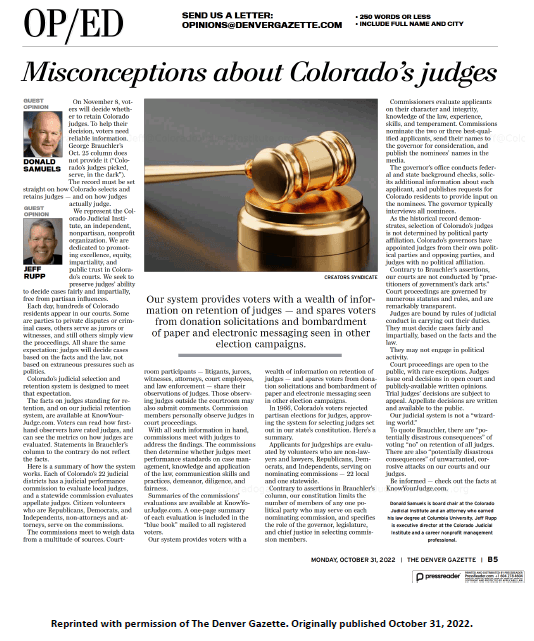
[Note: This CJI op/ed originally appeared in the October 31, 2022, issue of the Denver Gazette in response to a George Braucher column. Reprinted here with permission.]
On November 8, voters will decide whether to retain Colorado judges. To help their decision, voters need reliable information. George Brauchler's October 25 column does not provide it ("Colorado's judges picked, serve, in the dark").
The record must be set straight on how Colorado selects and retains judges — and on how judges actually judge.
We represent the Colorado Judicial Institute, an independent, nonpartisan, nonprofit organization. We are dedicated to promoting excellence, equity, impartiality, and public trust in Colorado's courts. We seek to preserve judges' ability to decide cases fairly and impartially, free from partisan influences.
Each day, hundreds of Colorado residents appear in our courts. Some are parties to private disputes or criminal cases, others serve as jurors or witnesses, and still others simply view the proceedings. All share the same expectation: judges will decide cases based on the facts and the law, not based on extraneous pressures such as politics.
Colorado's judicial selection and retention system is designed to meet that expectation.
The facts on judges standing for retention, and on our judicial retention system, are available at KnowYourJudge.com. Voters can read how first-hand observers have rated judges, and can see the metrics on how judges are evaluated. Statements in Brauchler's column to the contrary do not reflect the facts.
Here is a summary of how the system works. Each of Colorado's 22 judicial districts has a judicial performance commission to evaluate local judges, and a statewide commission evaluates appellate judges. Citizen volunteers who are Republicans, Democrats, and Independents, non-attorneys, and attorneys, serve on the commissions.
The commissions meet to weigh data from a multitude of sources. Courtroom participants — litigants, jurors, witnesses, attorneys, court employees, and law enforcement — share their observations of judges. Those observing judges outside the courtroom may also submit comments. Commission members personally observe judges in court proceedings.
With all such information in hand, commissions meet with judges to address the findings. The commissions then determine whether judges meet performance standards on case management, knowledge and application of the law, communication skills and practices, demeanor, diligence, and fairness.
Summaries of the commissions' evaluations are available at KnowYourJudge.com. A one-page summary of each evaluation is included in the "blue book" mailed to all registered voters.
Our system provides voters with a wealth of information on retention of judges — and spares voters from donation solicitations and bombardment of paper and electronic messaging seen in other election campaigns.
In 1966, Colorado's voters rejected partisan elections for judges, approving the system for selecting judges set out in our state's constitution. Here's a summary.
Applicants for judgeships are evaluated by volunteers who are non-lawyers and lawyers, Republicans, Democrats, and Independents, serving on nominating commissions — 22 local and one statewide.
Contrary to assertions in Brauchler's column, our constitution limits the number of members of any one political party who may serve on each nominating commission, and specifies the role of the governor, legislature, and chief justice in selecting commission members.
Commissioners evaluate applicants on their character and integrity, knowledge of the law, experience, skills, and temperament. Commissions nominate the two or three best-qualified applicants, send their names to the governor for consideration, and publish the nominees' names in the media.
The governor's office conducts federal and state background checks, solicits additional information about each applicant, and publishes requests for Colorado residents to provide input on the nominees. The governor typically interviews all nominees.
As the historical record demonstrates, selection of Colorado's judges is not determined by political party affiliation. Colorado's governors have appointed judges from their own political parties and opposing parties, and judges with no political affiliation.
Contrary to Brauchler's assertions, our courts are not conducted by "practitioners of government's dark arts." Court proceedings are governed by numerous statutes and rules, and are remarkably transparent.
Judges are bound by rules of judicial conduct in carrying out their duties. They must decide cases fairly and impartially, based on the facts and the law.
They may not engage in political activity.
Court proceedings are open to the public, with rare exceptions. Judges issue oral decisions in open court and publicly-available written opinions. Trial judges' decisions are subject to appeal. Appellate decisions are written and available to the public.
Our judicial system is not a "wizarding world."
To quote Brauchler, there are "potentially disastrous consequences" of voting "no" on retention of all judges. There are also "potentially disastrous consequences" of unwarranted, corrosive attacks on our courts and our judges.
Be informed -- check out the facts at KnowYourJudge.com.
Donald Samuels is board chair at the Colorado Judicial Institute and an attorney who earned his law degree at Columbia University. Jeff Rupp is executive director at the Colorado Judicial Institute and a career nonprofit management professional.

